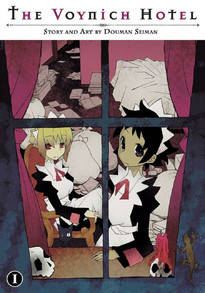Review
by Rebecca Silverman,The Voynich Hotel
GN 1
| Synopsis: |  |
||
On the war-scarred Pacific island nation of Blefuscu stands a strange hotel, the Voynich Hotel. Owned by a man in a Mexican wrestler's mask and staffed by two maids who are not quite who or what they seem, it appears to be the perfect place for Taizou Kuzuki to escape his past. But the island attracts plenty of shady and otherworldly people, from assassins to drug dealers to secret agents…it may not be the best place for Kuzuki to really “escape” to after all. |
|||
| Review: | |||
Seven Seas' use of a paraphrased line from the Eagles' 1977 song “Hotel California” on the back copy of The Voynich Hotel's first volume really does prepare you for what's going on inside. The song's last line is “You can check out anytime you like/But you can never leave,” and that along with songwriter Don Henley's statement that the song is about the loss of innocence feel like thematic elements of this volume as well. The story follows a strange group of people who have checked in to the eponymous Voynich Hotel on the island nation of Blefuscu. The (fictional) island was apparently the site of a lot of Japanese activity during an unnamed war (presumably WWII), as well as abortive attempts to turn it into a Japanese tourist destination. Now the hotel and an abandoned amusement park are all that remain, along with land minds left strewn around the island and the long, resentful memories of the locals. This is a place that lost its innocence long ago, and that makes it a fitting place for protagonist Taizou Kuzuki to retreat to, fleeing his life in Japan. While we don't find out precisely what he's fleeing until almost the end of the volume, it very quickly becomes evident that he's trying to go off the grid. This is not so much the result of Kuzuki himself as the other guests at the hotel – a group of drug dealers, a mangaka, and a guy who practically screams “shady.” The fact that one of the maids is clearly a stitched-together homunculus while the other is a bit too innocent to be believed makes for a very strange mix – one that Kuzuki is largely oblivious to. What's not clear is whether or not this obliviousness is deliberate or not; he seems to know that something is off with Berna and that his dreams about his dead grandmother aren't normal, but he also seems to brush them off as nothing to worry about. It's like he wants the otherworldly oddness of the hotel. This brings us to another interesting line from the Eagles' song, “we are all just prisoners here, of our own device.” All of Seiman's characters are essentially prisoners in the hotel or on the island, whether they were brought there for work or deliberately sought it out. The fact that three agents of death are part of the story – an assassin, a serial killer, and drug dealers – certainly implies that this is somewhere for people who break the law, but that someone like Kuzuki and the mangaka have deliberately sought out the hotel and the island brings us to the idea of voluntary prisoners. That no one really leaves even when they die returns us to the central theme of checking out but never leaving, making the Voynich seem like a limbo or purgatorial space, a place where someone goes after they leave somewhere else and have nowhere left to turn. The fact that the hotel and series are named after the Voynich Manuscript can help to explain the bizarre nature of the plot and characters. The Voynich Manuscript is a 15th century codex written in an unknown and undecipherable language. That implies that Seiman wanted this manga to have that same feeling, that we can make guesses as to what it means and what's going on, but ultimately it is a mystery. While that does feel a bit pretentious (although certainly no more so than the work of some of the literary Modernists), it also deliberately leaves the book open to our interpretations, allowing for a variety of meanings, some or none of which may be correct. It's not an easy read, but it is an interesting one, and if you like a story you really have to think through, this is an engaging exercise. It's also a fairly mature one, even though it's only rated “teen.” There's a multipage masturbation scene, a decent amount of violence, drug use, and a robot/android (there's some in-text disagreement on this point) who comes equipped with a vibrator for a penis. Nothing is terribly explicit and it's much more on the sexual side, but it could also come as a bit of a surprise when compared with other rated “T” titles from other publishers. Seiman's art is on the deliberately simple and blocky side, so nothing is hugely realistic. French manga publisher Akata has an imprint called “WTF?!” under which they publish titles like Magical Girl Ore and You Will be a Salmon, My Son. The Voynich Hotel would be right at home there, because upon first reading, that's pretty much the reaction it engenders. Deliberately bizarre with a definite nod to “Hotel California,” this is a series that does leave you thinking – even if that's just to wonder, “What did I just read?” |
| Grade: | |||
|
Overall : B
Story : B
Art : B-
+ Interesting combination of characters and setting, lots of interesting material to chew on |
|||
| discuss this in the forum (10 posts) | | |||
| Production Info: | ||
|
Full encyclopedia details about Release information about |
||